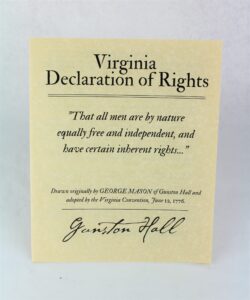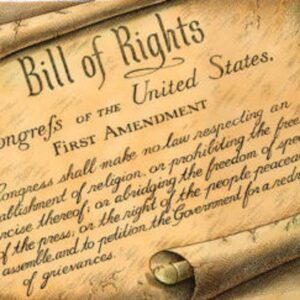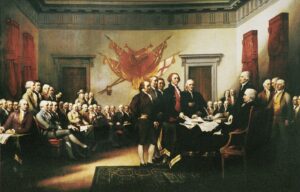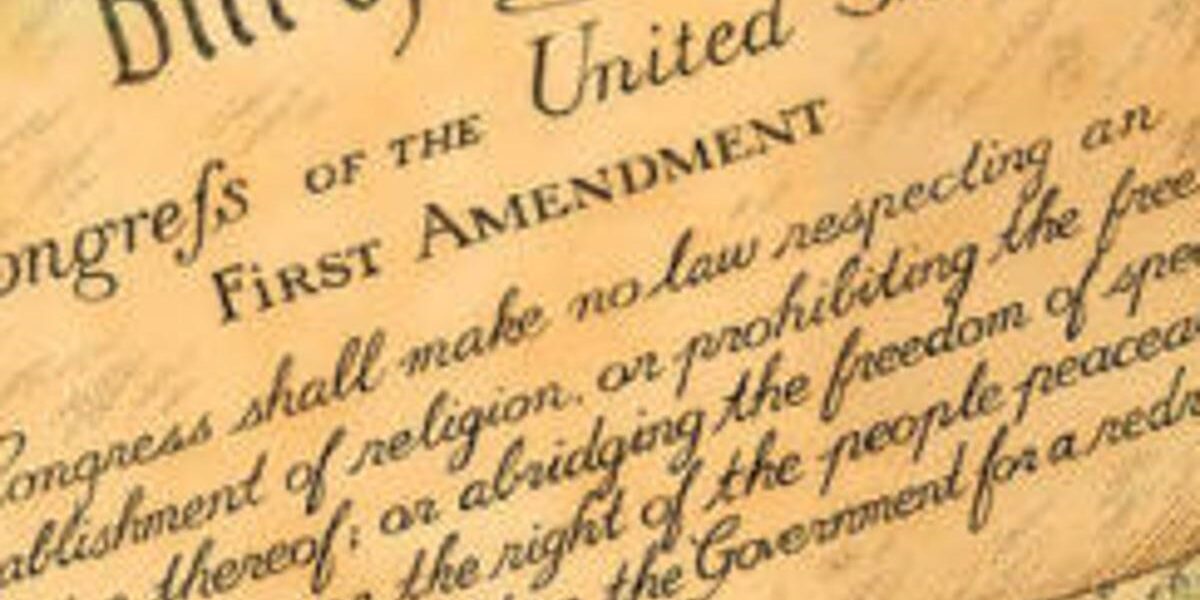 Genesis 1:28 states: “Be fruitful and multiply; fill the earth and subdue it.” The word “subdue,” from the Hebrew, is a word that indicates authority to steward the earth. Interestingly, we are not to take dominion over people. Also, we are accountable to God for our stewardship. The first piece of real estate was the Garden of Eden. Adam and Eve did not steward it, and they lost it.
Genesis 1:28 states: “Be fruitful and multiply; fill the earth and subdue it.” The word “subdue,” from the Hebrew, is a word that indicates authority to steward the earth. Interestingly, we are not to take dominion over people. Also, we are accountable to God for our stewardship. The first piece of real estate was the Garden of Eden. Adam and Eve did not steward it, and they lost it.
So what might this have to do with the phrase “pursuit of happiness” found in the Declaration of Independence? Thomas Jefferson, who penned the document, most likely took the phrase from the Virginia Declaration of Rights, ratified on June 12, 1776, only a few weeks before the Declaration was written. In it, George Mason referenced “the enjoyment of life and liberty, with the means of acquiring and possessing property, and pursuing and obtaining happiness and safety.” In other words, the phrase “pursuit of happiness” is another way of saying that the unalienable right of pursuing happiness is synonymous with acquiring property.
 The right of private property is deeply imbedded in Biblical theology. The sixth commandment, “Thou shalt not steal,” would mean nothing if there was no private property. The tenth commandment, “Thou shalt not covet,” indicates internal property of conscience. The only civil tax approved in the Bible is the head or poll tax (a set amount regardless of income). There were no income taxes, no property taxes, and no inheritance taxes in ancient Israel until she chose a King and got a centralized government.
The right of private property is deeply imbedded in Biblical theology. The sixth commandment, “Thou shalt not steal,” would mean nothing if there was no private property. The tenth commandment, “Thou shalt not covet,” indicates internal property of conscience. The only civil tax approved in the Bible is the head or poll tax (a set amount regardless of income). There were no income taxes, no property taxes, and no inheritance taxes in ancient Israel until she chose a King and got a centralized government.
In law, private property rights were termed allodial. Webster’s 1828 Dictionary defines allodium as “real estate held in absolute independence, without being subject to any rent, service, or acknowledgement of a superior. It is thus opposed to feud. In England, there is no allodial land, all land being held of the king; but in the United States, most lands are allodial.”
 Noting that feudal property came to England beginning with Norman the Conquerer in 1066, Thomas Jefferson wrote in 1774: “America was not conquered by William the Norman, nor its lands surrendered to him or any of his successors. Possessions there are, undoubtedly, of the Allodial nature.”
Noting that feudal property came to England beginning with Norman the Conquerer in 1066, Thomas Jefferson wrote in 1774: “America was not conquered by William the Norman, nor its lands surrendered to him or any of his successors. Possessions there are, undoubtedly, of the Allodial nature.”
But it would be James Madison whose classic definition of property, written in 1792, would come closest to the Biblical definition:
“Property… In the former sense, a man’s land, or merchandise, or money, is called his property. In the latter sense, a man has a property in his opinions and the free exercise of them. He has a property of peculiar value in his religious opinions, and in the profession and practice dictated by them…. In a word, as a man is said to have a right to his property, he may be equally said to have a property in his rights…. Conscience is the most sacred of all property.”
 In harmony with the Bible’s teaching on conscience, Madison articulates that there is internal and external property. The internal is “the most sacred property,” especially one’s religious opinions. In essence, the gospel, which alerts the individual of the need for regeneration, is the real “allodial” property in Christ and the origin of religious liberty. Christianity is unique in its support of religious liberty. A changed heart produces a Biblically informed conscience.
In harmony with the Bible’s teaching on conscience, Madison articulates that there is internal and external property. The internal is “the most sacred property,” especially one’s religious opinions. In essence, the gospel, which alerts the individual of the need for regeneration, is the real “allodial” property in Christ and the origin of religious liberty. Christianity is unique in its support of religious liberty. A changed heart produces a Biblically informed conscience.
George Mason articulated this idea politically in the Virginia Declaration of Rights when he wrote, “That religion, or the duty which we owe to our Creator, and the manner of discharging it, can be directed only by reason and conviction, not by force or violence; …all men are equally entitled to the free exercise of religion, according to the dictates of conscience…”
The Fifth Amendment of the Bill of Rights declares, “Nor shall private property be taken for public use, without just compensation.” Just compensation, determined at the private level, has now been replaced with a concept of feudal property, or eminent domain. The underlying premise is that civil government is sovereign, or eminent, over land ownership. After all, that is the rationale for paying property taxes (or rent from the State)!
 Justice Thomas, in Keto v. City of New London, wrote in his dissent: “Long ago, William Blackstone wrote that ‘the law of the land… postpones even public necessity to the sacred and inviolable rights of private property.’ The Framers embodied that principle in the Constitution, allowing the government to take property not for ‘public necessity,’ but instead for ‘public use.’”
Justice Thomas, in Keto v. City of New London, wrote in his dissent: “Long ago, William Blackstone wrote that ‘the law of the land… postpones even public necessity to the sacred and inviolable rights of private property.’ The Framers embodied that principle in the Constitution, allowing the government to take property not for ‘public necessity,’ but instead for ‘public use.’”
Theologian R. J. Rushdoony summarized eminent domain this way: “Eminent domain is thus an attribute of ultimate sovereignty, and therefore it is an attribute of divinity.” David Upham, writing for the Foundation for Economic Education, wrote succinctly in 1998: “The right to acquire and possess private property was in some ways the most important of individual rights.”
In conclusion, there are three statements I want to leave you with today:
(1) The theology of the Bible establishes an unalienable right of private property. You can lose this right by abusing that property.
(2) Second, the phrase “pursuit of happiness” in the Declaration means we have a right to pursue the acquisition of property, free and clear of government taxation or interference.
(3) Finally, the only way we will ever see a restoration of property rights in our nation is to preach the gospel and put our priority on the stewardship of conscience. Religious liberty is thus the battle ground for the pursuit of happiness.
 In the closing words of the Declaration, let us join with the Framers of our great Republic, and state clearly that it is “with a firm reliance on the protection of Divine Providence, [that] we mutually pledge to each other our Lives, our Fortunes, and our sacred Honor.” Amen, and may God restore this nation from the heart up!
In the closing words of the Declaration, let us join with the Framers of our great Republic, and state clearly that it is “with a firm reliance on the protection of Divine Providence, [that] we mutually pledge to each other our Lives, our Fortunes, and our sacred Honor.” Amen, and may God restore this nation from the heart up!







